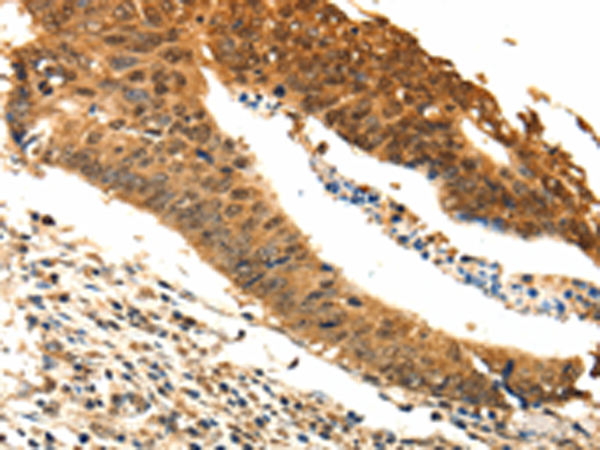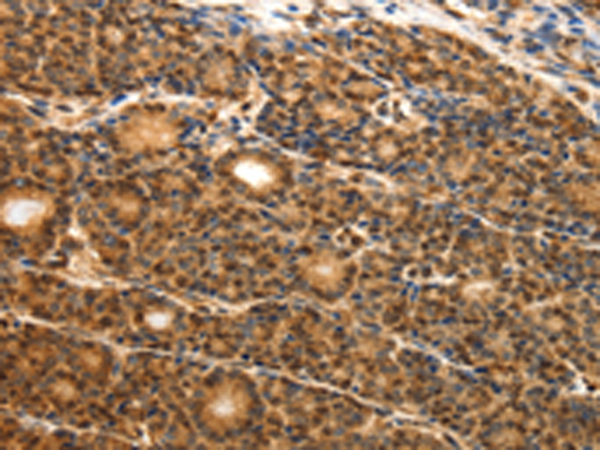

| WB | 咨询技术 | Human,Mouse,Rat |
| IF | 咨询技术 | Human,Mouse,Rat |
| IHC | 1/25-1/100 | Human,Mouse,Rat |
| ICC | 技术咨询 | Human,Mouse,Rat |
| FCM | 咨询技术 | Human,Mouse,Rat |
| Elisa | 1/1000-1/5000 | Human,Mouse,Rat |
| Aliases | ODC |
| Host/Isotype | Rabbit IgG |
| Antibody Type | Primary antibody |
| Storage | Store at 4°C short term. Aliquot and store at -20°C long term. Avoid freeze/thaw cycles. |
| Species Reactivity | Human, Mouse, Rat |
| Immunogen | Fusion protein of human ODC1 |
| Formulation | Purified antibody in PBS with 0.05% sodium azide and 50% glycerol. |
+ +
以下是关于ODC1抗体的3篇参考文献的简要概述:
---
1. **文献名称**:*"Ornithine decarboxylase expression in colorectal cancer: a clinical and molecular study"*
**作者**:Smith A, et al.
**摘要**:该研究通过免疫组化和Western blot技术,使用ODC1抗体分析结直肠癌组织中ODC1蛋白的表达水平,发现ODC1的高表达与肿瘤侵袭性和患者预后不良显著相关,提示其作为潜在生物标志物的价值。
---
2. **文献名称**:*"Targeting ODC1 in neuroblastoma: therapeutic implications of polyamine pathway inhibition"*
**作者**:Chen L, et al.
**摘要**:研究利用ODC1抗体检测神经母细胞瘤细胞系和小鼠模型中ODC1蛋白的表达,发现抑制ODC1活性可显著降低肿瘤生长,并阐明其通过调节多胺代谢影响细胞凋亡的机制。
---
3. **文献名称**:*"ODC1 overexpression drives cell cycle progression via polyamine signaling in breast cancer"*
**作者**:Wang Y, et al.
**摘要**:通过免疫荧光和流式细胞术结合ODC1抗体,研究揭示乳腺癌细胞中ODC1过表达通过激活多胺信号通路加速细胞周期进程,为靶向ODC1的乳腺癌治疗提供依据。
---
以上文献均以ODC1抗体作为关键实验工具,探讨ODC1蛋白在不同疾病中的功能及临床意义。
ODC1 (Ornithine Decarboxylase 1) is a rate-limiting enzyme in polyamine biosynthesis, catalyzing the conversion of ornithine to putrescine, a precursor for spermidine and spermine. Polyamines are essential for cell growth, proliferation, and differentiation, making ODC1 critical in cellular homeostasis. Dysregulation of ODC1 is linked to cancer, neurodegenerative diseases, and developmental disorders. Its expression is tightly regulated by oncoproteins like Myc and tumor suppressors, with overexpression observed in various cancers, correlating with poor prognosis.
ODC1 antibodies are vital tools for studying its expression, localization, and function in both normal and pathological contexts. These antibodies enable detection via techniques like Western blotting, immunohistochemistry, and immunofluorescence, aiding research into ODC1's role in cell cycle progression, apoptosis, and tumorigenesis. They also support therapeutic development, as ODC1 inhibition is explored in preclinical cancer models.
Commercially available ODC1 antibodies are typically raised in rabbits or mice against specific epitopes, with validation across species and applications. Challenges include cross-reactivity due to high homology with ODC-like proteins and variable performance in formalin-fixed tissues. Recent studies utilize ODC1 antibodies to investigate its post-translational regulation, including degradation via the 26S proteasome, and its interplay with antiviral responses or metabolic reprogramming in diseases.
×